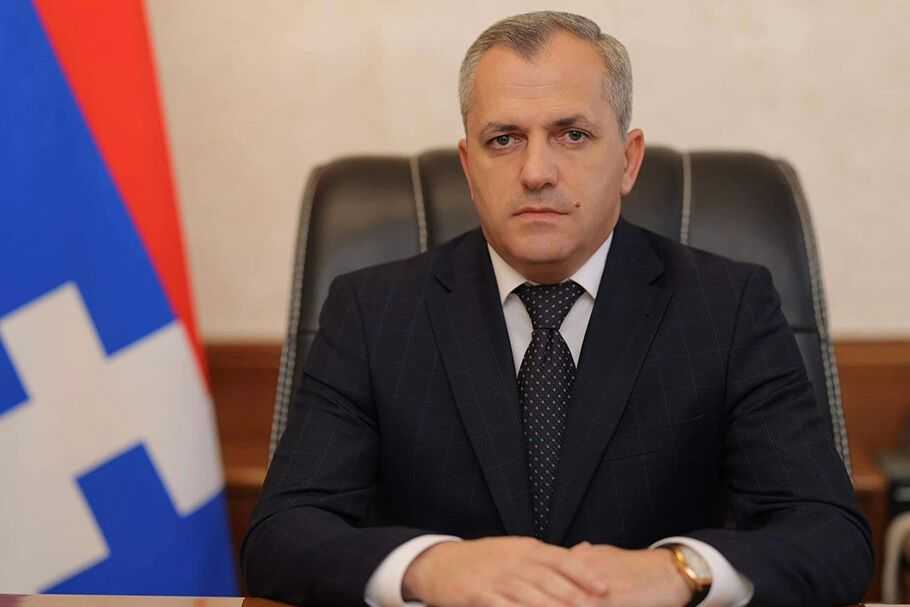
Nagorno-Karabakh’s former State Minister, Ruben Vardanyan, could be facing 45 new charges whilst in Azerbaijani detention, with 15 other former officials having their cases sent to court.
On Monday, Vardanyan’s legal team noted that Azerbaijani prosecutors had unveiled ‘some 45 potential charges’ against the former official, and that the charges covered 20 different Azerbaijani criminal code articles. If found convicted of those charges, Vardanyan could face life imprisonment.
Vardanyan, a Russian–Armenian businessperson and billionaire, was appointed State Minister by then-President Arayik Harutyunyan in November 2022. He was dismissed in February 2023, but remained heavily involved in Nagorno-Karabakh’s politics.
He was detained by Azerbaijan along with seven other former Nagorno-Karabakh officials in September 2023 as they attempted to cross into Armenia following Azerbaijan’s final assault on the region.
His appointment proved controversial from the beginning, in part due to his business links in Russia. Vardanyan also gained attention and notoriety for his frequent live broadcasts from Nagorno-Karabakh during the first months of the Lachin corridor blockade, and for criticism he received from the Azerbaijani authorities — including President Ilham Aliyev.
In their statement, his lawyers said that the evidence compiled against Vardanyan, collected in ‘more than 25,000 pages across 100 volumes’, all written in Azerbaijani, was ‘conveniently hidden’ both from Vardanyan and the public.
‘The regime has, at the same time, refused to provide copies of the alleged evidence to Vardanyan and counsel, who are currently only allowed to review these materials without a proper translation and at limited times,’ read the legal team’s statement.
It also noted that they were restricted from taking notes due to alleged national security risks, ‘further constraining’ the lawyers’ ‘extremely limited ability to prepare the defence for the trial’.
‘Azerbaijan’s refusal to provide and make public all of the charges and so-called evidence against Ruben for review reaffirms that the charges are politically motivated and that the regime knows no objective observer would conclude there is any credible evidence to support its allegations’, Jared Genser, Vardanyan’s legal counsel, said, adding that the approach was ‘clearly designed for Aliyev to justify holding a secret trial before a tribunal that will be neither independent nor impartial’.
In October, Vardanyan’s lawyers filed legal actions in Baku, alleging that he had been tortured during his hunger strike in April and that he was denied the right to a speedy trial.
On Tuesday, Azerbaijan’s Prosecutor General’s Office announced that a criminal case involving 15 suspects had been sent to the Baku Military Court the day before. The defendants were accused of committing crimes in a total of 2,548 instances, including genocide, slavery, enforced disappearance of persons, torture, financing of terrorism, the creation of a criminal association, and more.
The names of those accused included three former Nagorno-Karabakh presidents — Arayik Harutyunyan (2020–2023, Arkadi Ghukasyan (1997–2007), and Bako Sahakyan (2007–2020) — as well as the former Parliamentary Speaker Davit Ishkhanyan, former Foreign Minister Davit Babayan, and former Nagorno-Karabakh Army Commander Levon Mnatsakanyan. Vardanyan’s case has not yet been brought to court.
In May, the Prosecutor’s Office reportedly combined 1,389 criminal cases allegedly committed by Armenians from October 1987 to April 2024 into a single case. They noted that criminal cases against persons accused of committing multiple crimes were separated into separate hearings.
They also invited Armenian officials to cooperate with them, ‘guided by the serious grounds for the presence of many suspects and witnesses in the aforementioned episodes in connection with this investigation’.
For ease of reading, we choose not to use qualifiers such as ‘de facto’, ‘unrecognised’, or ‘partially recognised’ when discussing institutions or political positions within Abkhazia, Nagorno-Karabakh, and South Ossetia. This does not imply a position on their status.









